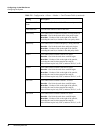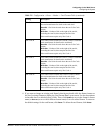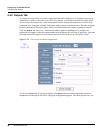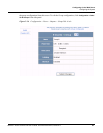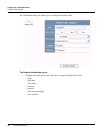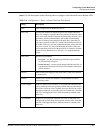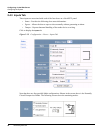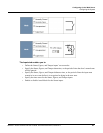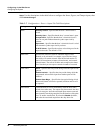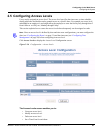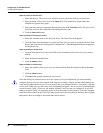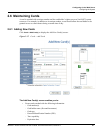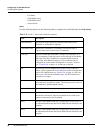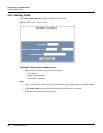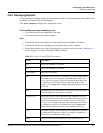
44 www.honeywell.com
Configuring via the Web Server
Configuring the System
Steps: Use the descriptions in the table below to configure the Status, Egress, and Tamper inputs, then
click
Submit Changes:
Table 2-7: Configuration > Doors > Inputs Tab Field Descriptions
Setting Description
Mode
Normally Closed – Specifies that the door’s normal state is
closed.
Normally Open – Specifies that the door’s normal state is open.
Unsupervised – Specifies that the door’s electrical circuit is
wired in one path without alternative paths supervised by
resistors.
Supervised – Specifies that the door’s electrical circuit is wired
with alternative paths supervised by resistors.
R1 & R2 Values – Specifies the resistor values being used in the
supervised modes. The default is 2.2K.
Shunt Time Specifies the amount of time for which the inputs will be
shunted, or de-activated. For example, it specifies how long a
door strike will remain released. Enter the desired number of
hours (1024 maximum), minutes (60 maximum), and seconds
(60 maximum). The sum of all three units comprises the shunt
time. Note that you can express seconds in tenths of a second.
Time Zones
Shunt – Specifies the time period during which the input will be
ignored.
Disable Interlock – Specifies the time period during which the
programmed action on this input from another point will be
disabled.
Disable Alarm Msgs – Specifies the time period during which
Alarm and Normal will not be reported, but Short and Cut will
be reported.
Auto-Relock Causes the door to re-lock immediately when the door status
switch closes after entry. The output relay that controls the door
strike de-energizes when the associated input returns to normal
state instead of remaining energized for the duration of the pulse
time. To enable Auto-Relock, de-select the
Disable checkbox,
and select the associated output from the drop down list.



